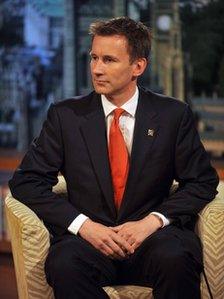The Michel emails - questions for the FSA?
- Published
- comments

Jeremy Hunt has asked for his appearance at the Leveson Inquiry to be brought forward
Jeremy Hunt's defence, against charges that he did not act as an impartial judge when exercising his powers to decide on whether News Corp should have been allowed to buy all of BSkyB, rests on a particular plank.
His colleagues say that he decided nothing without getting the thumbs-up from the media regulator, Ofcom.
So although the Enterprise Act gives him discretionary powers to adjudicate on whether a media takeover restricts plurality or choice for consumers in an excessive way, he restricted his discretion by doing nothing that was not approved by Ofcom.
As someone who covered this controversial takeover attempt, I recall that he was fastidious in seeking and publishing the opinion of Ofcom, and of the Office of Fair Trading, the UK's main competition watchdog.
Questions to answer
But there are two residual questions for him of great significance.
In early January, after Ofcom had decided - though not announced - that the deal would restrict plurality, and should therefore be subject to a much longer and more detailed investigation by the Competition Commission, he could have sent the deal more-or-less directly to the Commission for that oversight.
But, as James Murdoch conceded yesterday at the Leveson Inquiry, News Corporation did not want this further lengthy scrutiny - because time is money.
News Corp preferred to negotiate undertakings to purge the harm to plurality perceived by Ofcom. And Mr Hunt allowed BSkyB to do this.
So, in view of Mr Hunt's publicly stated admiration for News Corp and Rupert Murdoch, he probably now needs to demonstrate that he was not doing a favour to News Corp by permitting the negotiation of these remedies - which ultimately involved News Corp promising to spin-off 61% of Sky News.
Secondly, and perhaps more seriously, he needs to say whether he believes his special adviser, Adam Smith, was being too helpful to News Corp - and if Mr Smith was being too helpful, was he acting on instructions or as a freelancer.
Many of the emails by News Corp's director of public affairs, Fred Michel - which were published yesterday - speak to this point. But I will simply look at the one sent to James Murdoch on 24 January which contains the resonant phrase (in bold), "managed to get some infos on the plans for tomorrow (although absolutely illegal..>!)."
This discloses to James Murdoch that Mr Hunt would make a press statement at 7.30am and a statement to parliament at 9.30am.
This statement would confirm that Ofcom felt the BSkyB takeover would harm plurality and should be passed to the Competition Commission - but would also say that News Corp would be given an opportunity to come up with remedies (or undertakings in lieu, to use the jargon), to prevent the Commission investigation.
Now Mr Hunt's planned statements to the press and parliament were confidential and price sensitive (with a bearing on the share prices of BSkyB and of News Corp). I know this because the DCMS said this to me, explicitly, at the time.
But Mr Michel had learned what Mr Hunt would say, from Mr Smith (or so Mr Michel says). And Mr Michel was discussing Mr Hunt's planned statement with Mr Murdoch at 3.21pm, the time of the email, or while markets were still open.
So, on the face of it, Mr Michel and Mr Murdoch should not have been given this information, or at least not without signing a formal confidentiality agreement.
Mr Michel implied, with his "absolutely illegal" comment, that no confidentiality agreement had been signed.
Now it may be that the transmission of this information was covered by some general duty of confidentiality. But it does all look a bit odd.
And, apart from future enquiries by Leveson, I would expect the watchdog, the Financial Services Authority, to verify that all the proper niceties were followed.